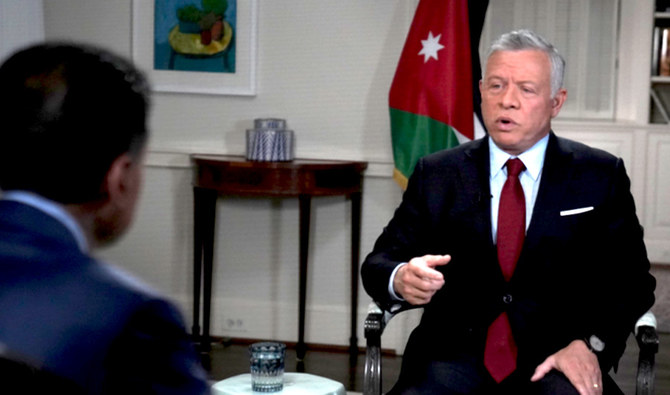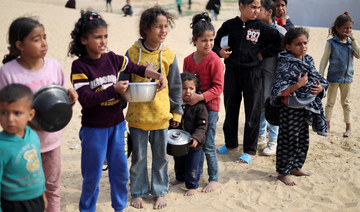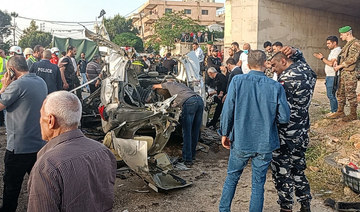LONDON: Jordan’s King Abdullah II said on Sunday that his country had previously been attacked by Iranian-made drones, adding that there are many concerns related to Iran’s activities in the region.
Speaking during an interview with CNN’s Fareed Zakaria, the king said: “Jordan always supports dialogue…(but) there are legitimate concerns in our part of the world on a lot of portfolios that the Americans are hopefully going to discuss with the Iranians.”
He said that the nuclear program affects Israel as it does the Gulf, and the Tehran regime’s ballistic technology has improved dramatically, adding that attacks on US bases in Iraq and cross border attacks on Saudi Arabia from Yemen are witness to that.
“(Attacks on) Israel from Syria and Lebanon to an extent, and what misses Israel, sometimes lands in Jordan.
“And add to that increased cyberattacks on many of our countries, the fire fights on our borders have increased almost to the times when we were at the high end with Daesh and unfortunately, Jordan has been attacked by drones that have come out, that are Iranian signature that we have had to deal with in the past year or so and escalated,” he said.
On the Iranian nuclear talks in Vienna, which have been postponed until the new government in Iran settles, he said: “I have a feeling that where the American position is and where the Iranian position is, is somewhat far apart,” adding that Jordan would like to address these regional concerns with the Iranians at those talks, and bridge that gap.
King Abdullah is currently in the US on a two-week visit where he met with US President Joe Biden last week, the first Middle East leader to visit the White House since the president was sworn in at the start of the year. The king first met Biden when he was crown prince and the latter was a senator.
“President Biden I have known since I was a young man visiting the Congress with my father, when he was a young senator, so this is an old friendship. And my son has known the president; as Joe Biden was the vice president, my son used to go and visit him at his house and in his office, so it’s a family friendship.”
He said: “As the first leader from that part of the world, it was important to unify messaging, because there are a lot of challenges. So, it was important for me not only to meet with the Palestinian leadership after a war, which I did, with Abu Mazen (Palestinian President Mahmoud Abbas); I met the prime minister; I met General (Benny) Gantz.”
He said the most recent 11-day war that rocked Gaza was different to the previous ones as it was a “wake-up call” for the Palestinian and Israeli people, adding that he thinks the the next war is going to be even more damaging.
The king called for a return to the negotiating table, to build on the two-state solution, and get the Palestinians and Israelis engaging again.
“I think we have seen in the past couple of weeks, not only a better understanding between Israel and Jordan, but the voices coming out of both Israel and Palestine that we need to move forward and reset that relationship.”
On recent sedition trials in Jordan, the king said he was saddened that one of the people involved in the plot was his brother and that certain individuals used his brother for their own agendas.
Jordan’s military State Security Court sentenced Bassem Awadallah, a former chief of the Jordanian Royal Court, and Sharif Hassan bin Zaid, a distant member of the royal family, to 15 years of hard labor each on July 12 for their involvement in the high-profile sedition case.
Awadallah and Bin Zaid were arrested on April 3 along with 15 other people suspected of involvement in the case, which also involved Prince Hamzah bin Hussein, a half-brother of King Abdullah.
“The intelligence services, as they always do, gather information, and they got to a point where they had legitimate concerns that certain individuals were trying to push my brother’s ambitions for their own agendas, and decided, quite rightly, to nip it in the bud, and quietly.
“If it had not been for the irresponsible manner of secretly taping conversations with officials from Jordan or leaking videos, you and I would not be having this conversation,” the king said.


























